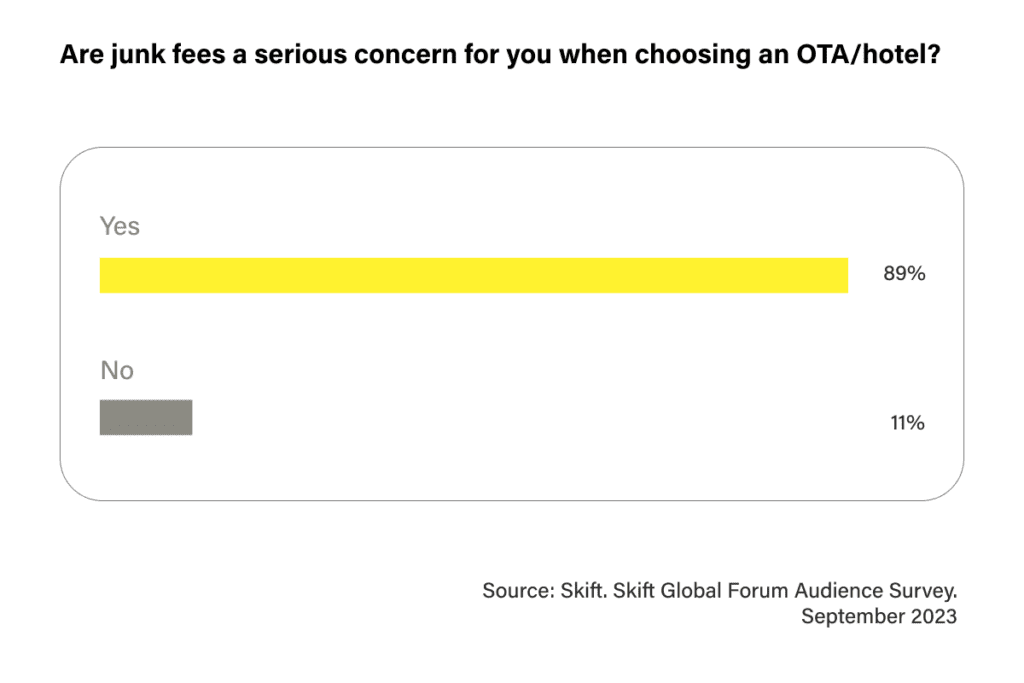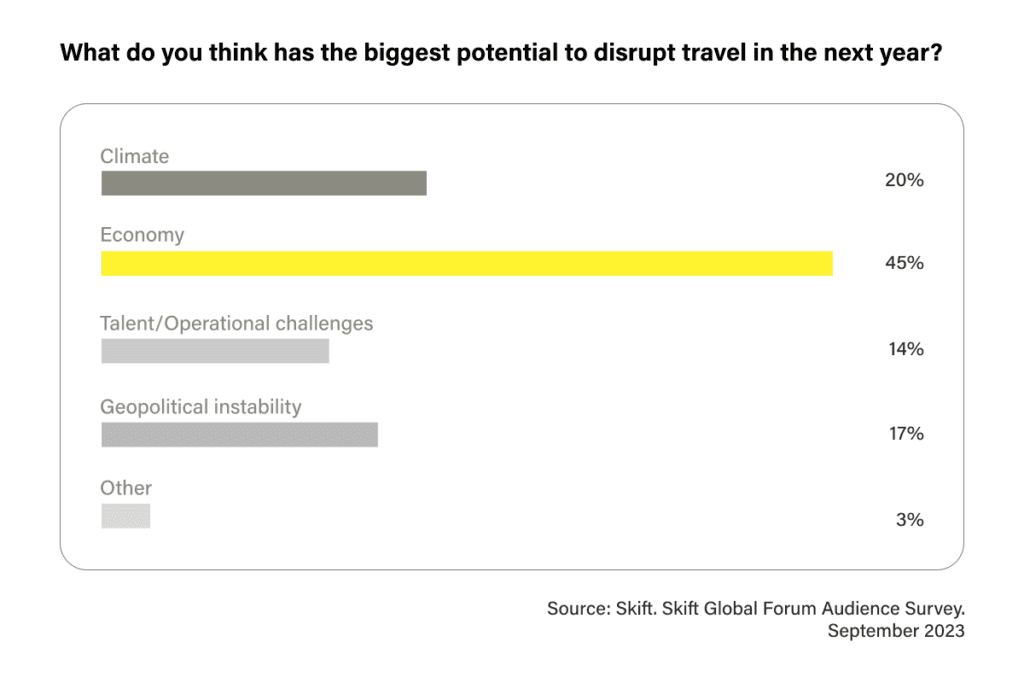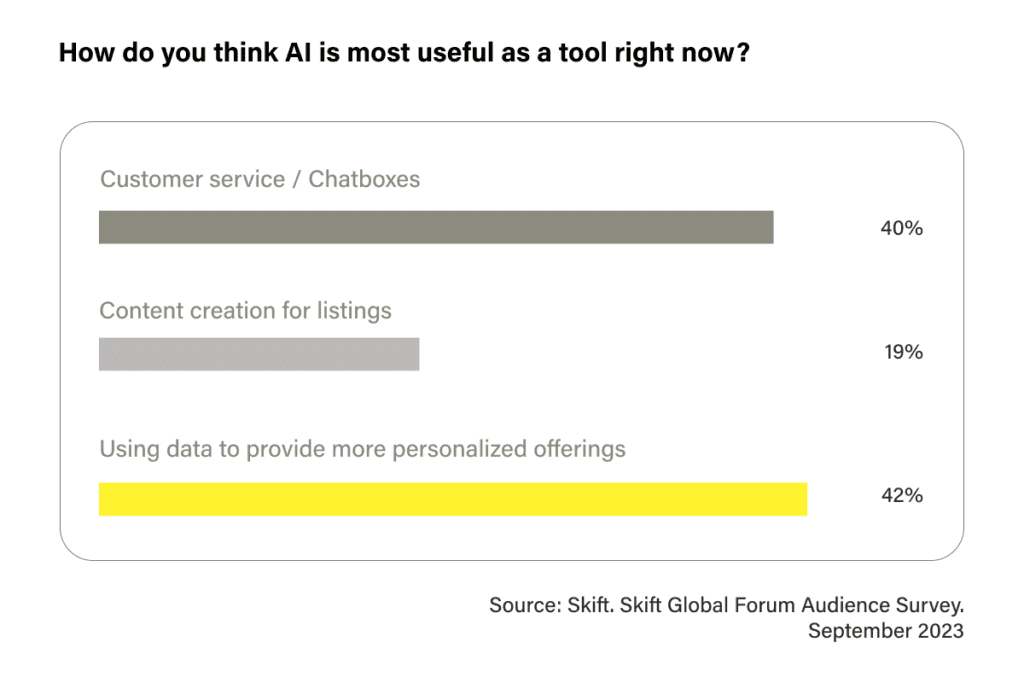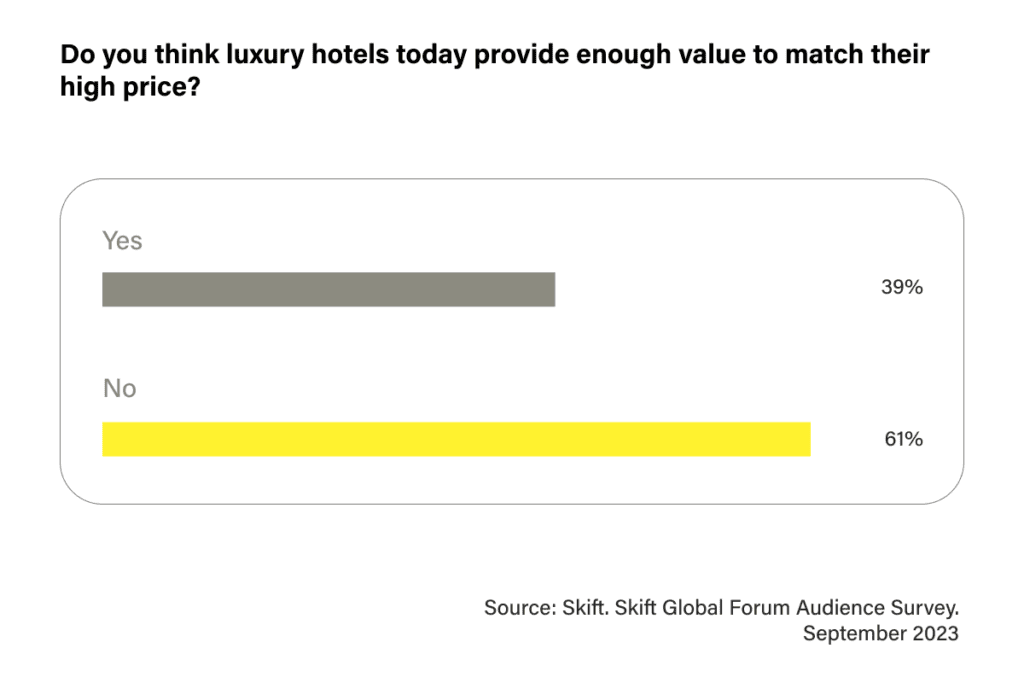Skift Global Forum Attendees Share Their Thoughts on 4 Key Travel Topics

Skift Take
This sponsored content was created in collaboration with a Skift partner.
After the roller coaster ride of 2022, with some regions flourishing and other sectors facing challenges, 2023 has emerged as the year of the travel industry’s comeback. While the industry still faces lingering supply chain issues and pockets of uncertainty in demand, the overall outlook is optimistic: Leisure travel remains strong, and business travel is slowly regaining ground. Amid these promising signs of growth, it’s important to stay ahead of the game by proactively addressing prominent challenges.
In light of this, we polled our Skift Global Forum audience of about 1,000 travel industry executives to gain their insights about some of the biggest challenges and transformations the industry is currently facing. From potential travel disruptors and the pivotal role of AI to concerns over hidden fees and the price-value paradox of luxury hotels, here’s how Skift Global Forum attendees feel about four key topics driving the future of the travel industry.
Junk Fees Are a Major Hurdle for Travelers
President Biden’s crackdown on junk fees — defined by The White House as “hidden, surprise fees that companies sneak onto customer bills” — shed a bright spotlight on this growing problem last year, which until then flew quietly under the radar for the general public. If passed, The Junk Fees Prevention Act will address the issue of transparency in pricing and put an end to businesses imposing excessive fees on customers.
In the meantime, travelers are increasingly frustrated with the proliferation of exploitative — and sometimes outright fraudulent — fees that plague their travel bookings. These fees not only diminish the overall value of a guest’s hotel stay or a passenger’s flight but erode customers’ trust in travel providers. Our survey revealed that industry executives feel similarly.
When asked if they themselves believe junk fees are a serious concern when choosing an OTA or hotel, the answer was a resounding yes from 89 percent of the participants. Only 11 percent said no.

The results reveal the fact that transparency is crucial. Consumers have a right to know their final bill, without unwelcome surprises at checkout. Travel providers that offer a clear, all-inclusive pricing structure may gain a substantial advantage in attracting and retaining guests.
The Interplay of Global Dynamics Is Disrupting the Future of Travel
In the eyes of industry executives, there are a few potential bumps in the road that could disrupt travel over the next year. The concern around the global economy casts a long shadow on the travel industry. Although the global economic outlook is improving, recovery is weak, and inflation continues to weigh on economic activity. Our poll revealed that 45 percent of industry executives consider the economy the biggest factor in travel disruption for 2024.

Another 20 percent of travel executives agreed that climate will be the biggest contributor to an unpredictable travel landscape. Climate shifts and extreme weather events continue to make storms harder to predict, leading to flight cancellations, travel restrictions, and changes in destination choices.
Meanwhile, 17 percent of industry experts said geopolitical instability — such as the war in Ukraine, increased fissures between Russia and the West, and Israel’s recent declaration of war against Hamas — will have the largest impact on travel over the next year.
And even though many hotels now offer record wages, job flexibility, and better benefits, eight out of 10 hotels still have staffing shortages, and the airline industry is short roughly 32,000 commercial pilots, mechanics, and air traffic controllers. Of the surveyed executives, 14 percent view talent issues and operational challenges as the primary disruptor of travel over the next year.
AI Is Reshaping How the Travel Industry Does Business
“Connection in the Age of AI” was this year’s theme at Skift Global Forum, and our poll results show that industry executives believe it offers game-changing opportunities for travel businesses.
While AI can never replace the human-to-human connections that define travel, it can optimize business operations and enhance how companies in the industry engage with their customers. Of the travel executives surveyed, 42 percent agreed that AI is most useful for using data to provide more personalized offerings. For example, with AI, hotels can efficiently analyze vast amounts of guest data, curate bespoke experiences, suggest relevant activities and personalized offers, and customize in-room amenities.

Meanwhile, 40 percent of travel leaders said customer service and chatboxes are the most useful functions of AI. For instance, AI-powered chatboxes efficiently manage tasks such as airline flight bookings and itinerary changes, while also providing instant 24/7 responses to passenger inquiries.
Another 19 percent of industry experts said AI is most beneficial for content creation of online listings. It can generate captivating images and compelling descriptions that highlight unique experiences offered by activities, helping attract potential customers and improving online visibility.
Luxury Hotels Must Address Their Price-Value Paradox
The definition of luxury in travel is changing as travelers increasingly prioritize bespoke experiences and meaningful connections over traditional materialistic amenities. Although 39 percent of travel executives agreed that luxury hotels provide enough value to match their high prices, many more industry experts — 61 percent — disagreed.

During the Skift Global Forum session, “Redefining Luxury in a Modern World,” Omer Acar, CEO of Raffles, shared his belief that luxury hotels must significantly transform how they approach customer satisfaction, focusing on service over goods.
Today’s travelers tend to put less importance on tangible amenities, such as thread counts and complimentary fruit baskets, than they used to. Instead, luxury hotels must recognize their true value lies in connecting with guests on a deeper, personal level. To achieve this, they need to craft memorable, one-of-a-kind experiences that extend beyond the guest room walls. The future of luxury lies in the realm of experiences, where each guest feels like a VIP.
In the ever-evolving world of travel, these industry experts have shed light on important issues that must be considered as we navigate the path ahead. It’s clear that the industry is entering a moment of unprecedented change, and these insights can help us better prepare for what comes next.
This content was created collaboratively by AIG and Skift’s branded content studio, SkiftX.




